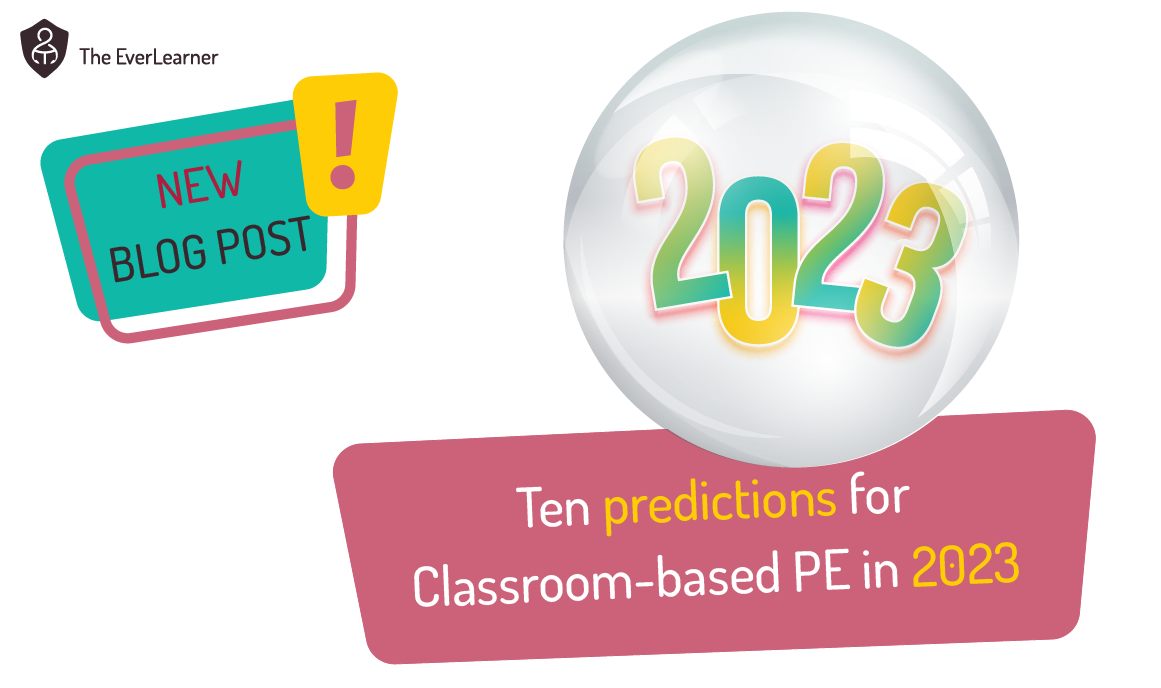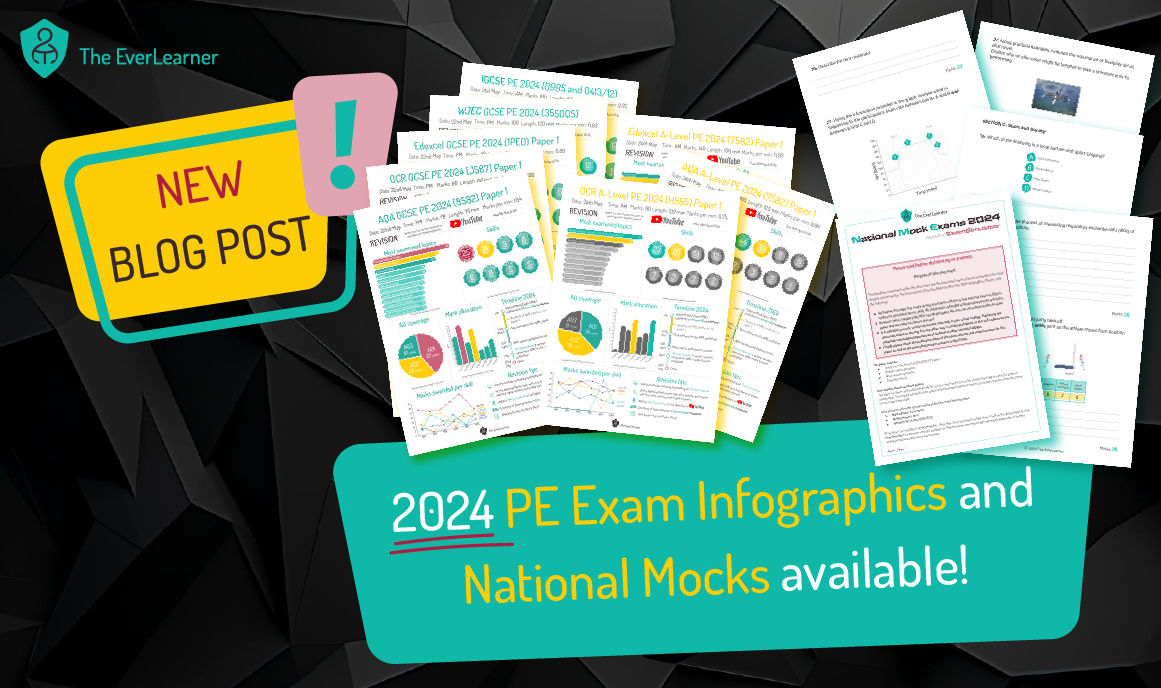OCR Nationals 2022 versus BTEC Sport Tech Award 2022: And the Winner is…
Technical qualifications at KS4 are changing. From September 2022, the legacy qualifications in BTEC Sport First Award, BTEC Sport Technical Award and OCR Nationals in Sport Science and Sport Studies will no longer appear on school performance tables apart from the final year of assessments in 2023. These courses are being *replaced by alternative technical qualifications linked with the Government’s consultation of technical qualifications.
*The legacy qualifications will continue to be available but will not be viable qualifications in most cases as they do not qualify on performance tables.
You may have previously read my review of the new BTEC Tech Award in Sport 2022. If you have not, you can find that here and I recommend doing so in combination with this post. The current BTEC First Award is being replaced by the new BTEC Tech Award in Sport meaning that our most successful course is no longer a viable KS4 course: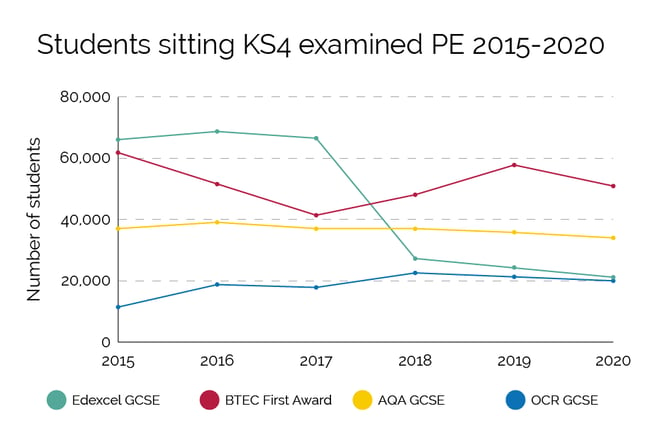 Furthermore, this popular course is being *replaced during a period of decline in academic PE qualifications at KS4 in general:
Furthermore, this popular course is being *replaced during a period of decline in academic PE qualifications at KS4 in general: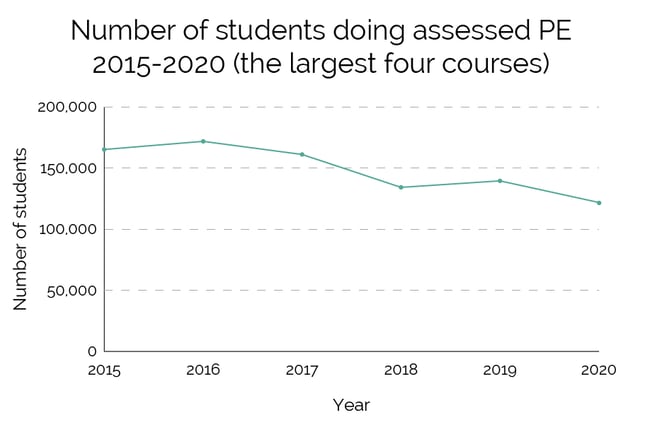 Therefore, I have predicted that the new BTEC Tech Award in Sport—the biggest academic PE qualification in England and Wales—will experience a decline of up to 25% in course numbers, potentially adding to a currently maligned sector. This means that up to 15,000 students will need to be “rehomed” based on current trends and that centres will need to make one of the following decisions:
Therefore, I have predicted that the new BTEC Tech Award in Sport—the biggest academic PE qualification in England and Wales—will experience a decline of up to 25% in course numbers, potentially adding to a currently maligned sector. This means that up to 15,000 students will need to be “rehomed” based on current trends and that centres will need to make one of the following decisions:
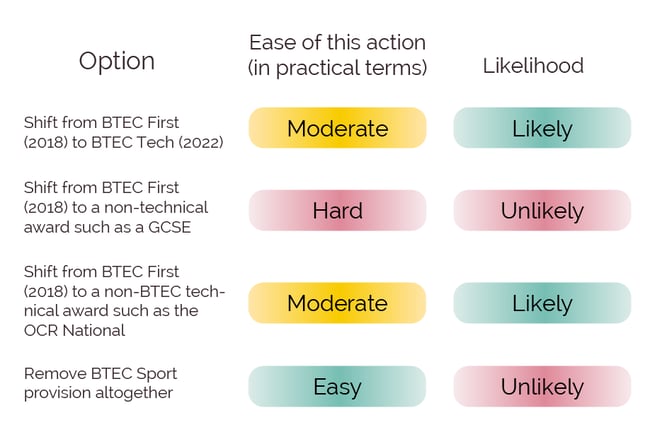
So, what is the popularity of the current OCR Nationals?
The current OCR Nationals in Sport Science and Sport Studies are far less popular than the current BTEC Sport First Award:.png?width=1175&name=OCRNationals_versus_BTECSportTechAward_blog_popularity%20(1).png) *Ranking amongst the three qualifications only and not taking into account other qualifications such as GCSE, VCERT, BTEC Tech Award (legacy).
*Ranking amongst the three qualifications only and not taking into account other qualifications such as GCSE, VCERT, BTEC Tech Award (legacy).
In other words, OCR Nationals are succeeding but at a much smaller scale than the BTEC Sport First Award.
In mid-2021, OCR made a smart move and published their new OCR National 2022 courses far in advance of the release of the BTEC Tech Award (2022) guidance from Edexcel. This has allowed colleagues to get a good feel for the OCR offer whilst the Edexcel provision was not yet public. This was a smart move by OCR and may well work efficiently as a “land grab”.
Tell me more about the new OCR Nationals…
OCR are providing two qualification pathways:
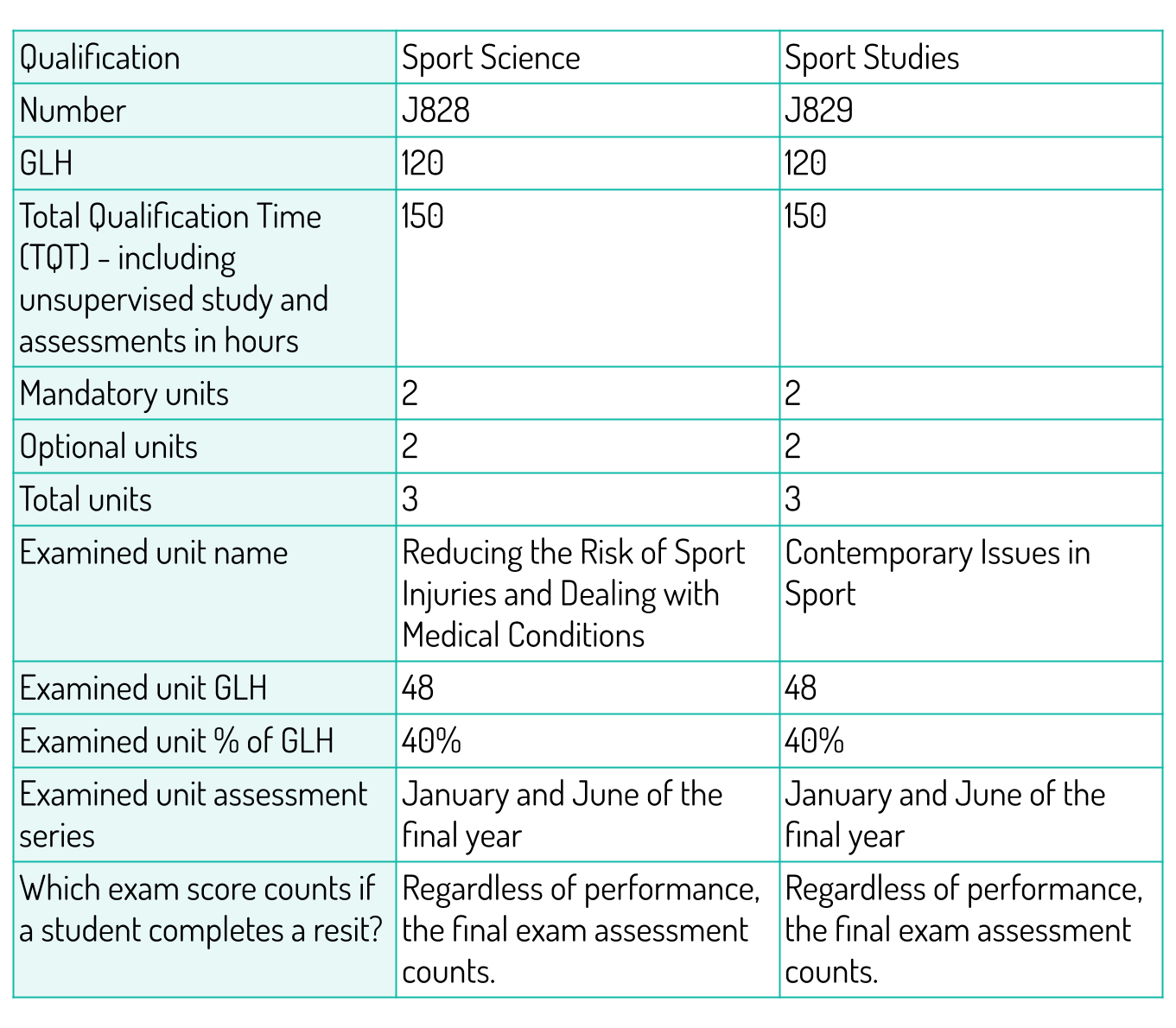
…and now a closer look at each course:
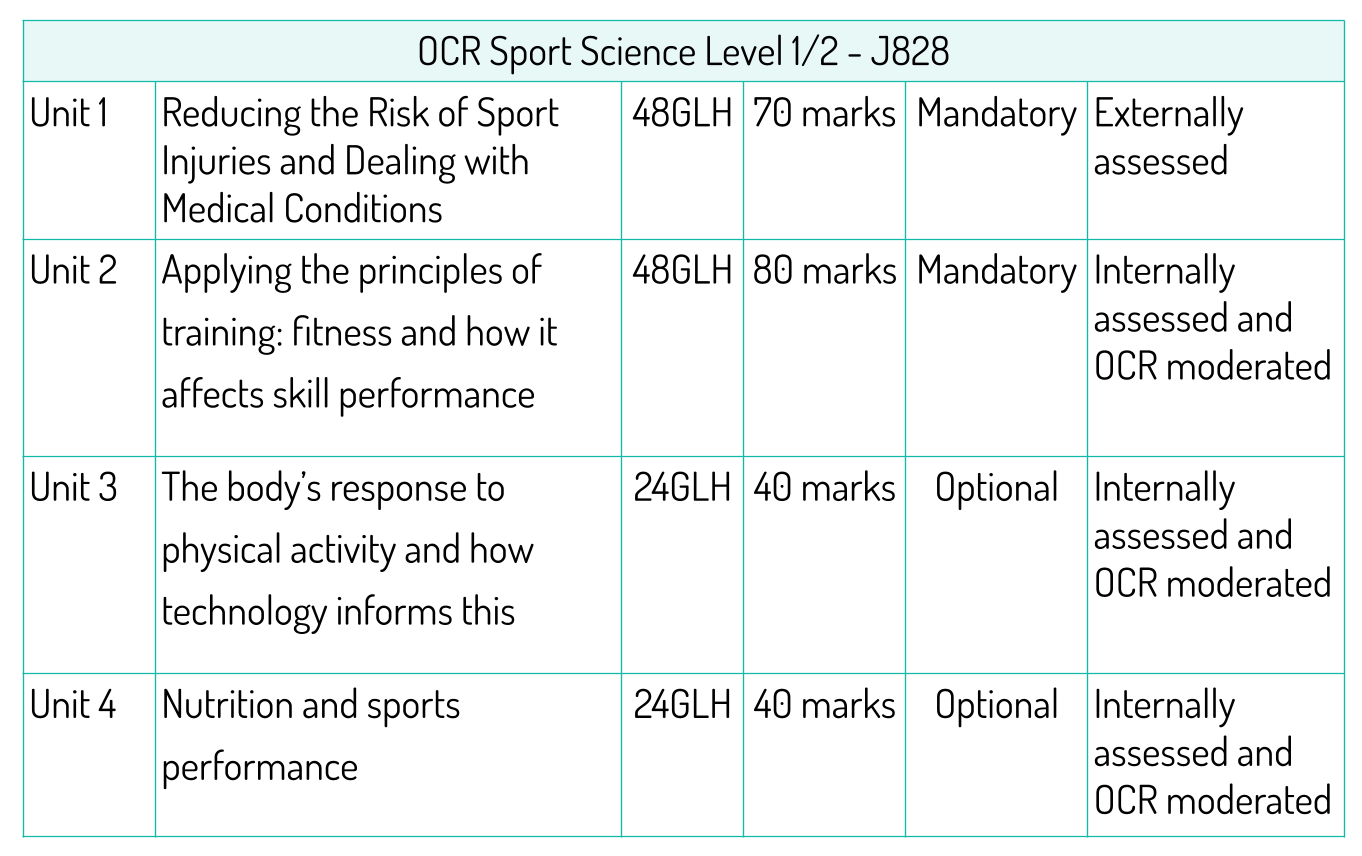 This course will be popular with current OCR National centres because there is relative consistency with the current content being taught but also because of the introduction of optionality in units 3 and 4. Current BTEC centres should recognise that this course does not include practical performance in any assessment format.
This course will be popular with current OCR National centres because there is relative consistency with the current content being taught but also because of the introduction of optionality in units 3 and 4. Current BTEC centres should recognise that this course does not include practical performance in any assessment format.
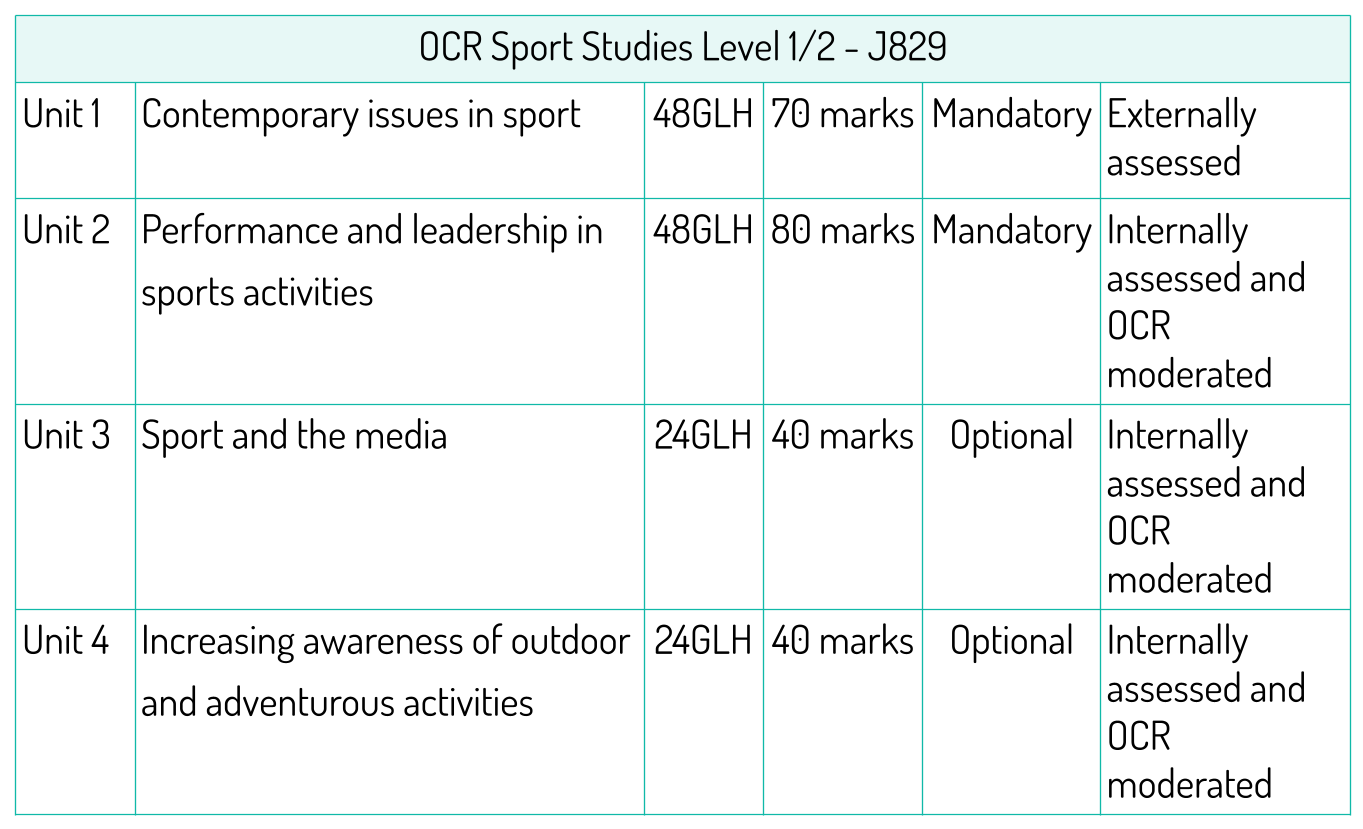 This course will be popular with current OCR Nationals centres because, again, there is good consistency with the current offering and optionality has been included. Current BTEC centres should recognise that this course does include practical performance within Unit 2. Furthermore, current BTEC First Award Centres who are offering optional Unit 6 should note that the new OCR Sport Studies provides opportunities for activity leadership in Unit 2. This will be a popular transfer for the centres in question.
This course will be popular with current OCR Nationals centres because, again, there is good consistency with the current offering and optionality has been included. Current BTEC centres should recognise that this course does include practical performance within Unit 2. Furthermore, current BTEC First Award Centres who are offering optional Unit 6 should note that the new OCR Sport Studies provides opportunities for activity leadership in Unit 2. This will be a popular transfer for the centres in question.
Tell me more about OCR National exams…
Firstly, they are not new. The current OCR Nationals both feature mandatory examined units and the assessments are highly regarded by the centres taking them. There is no reason to doubt that this will continue post-2022.
Here is how the papers compare when considering the new BTEC Tech Award also:
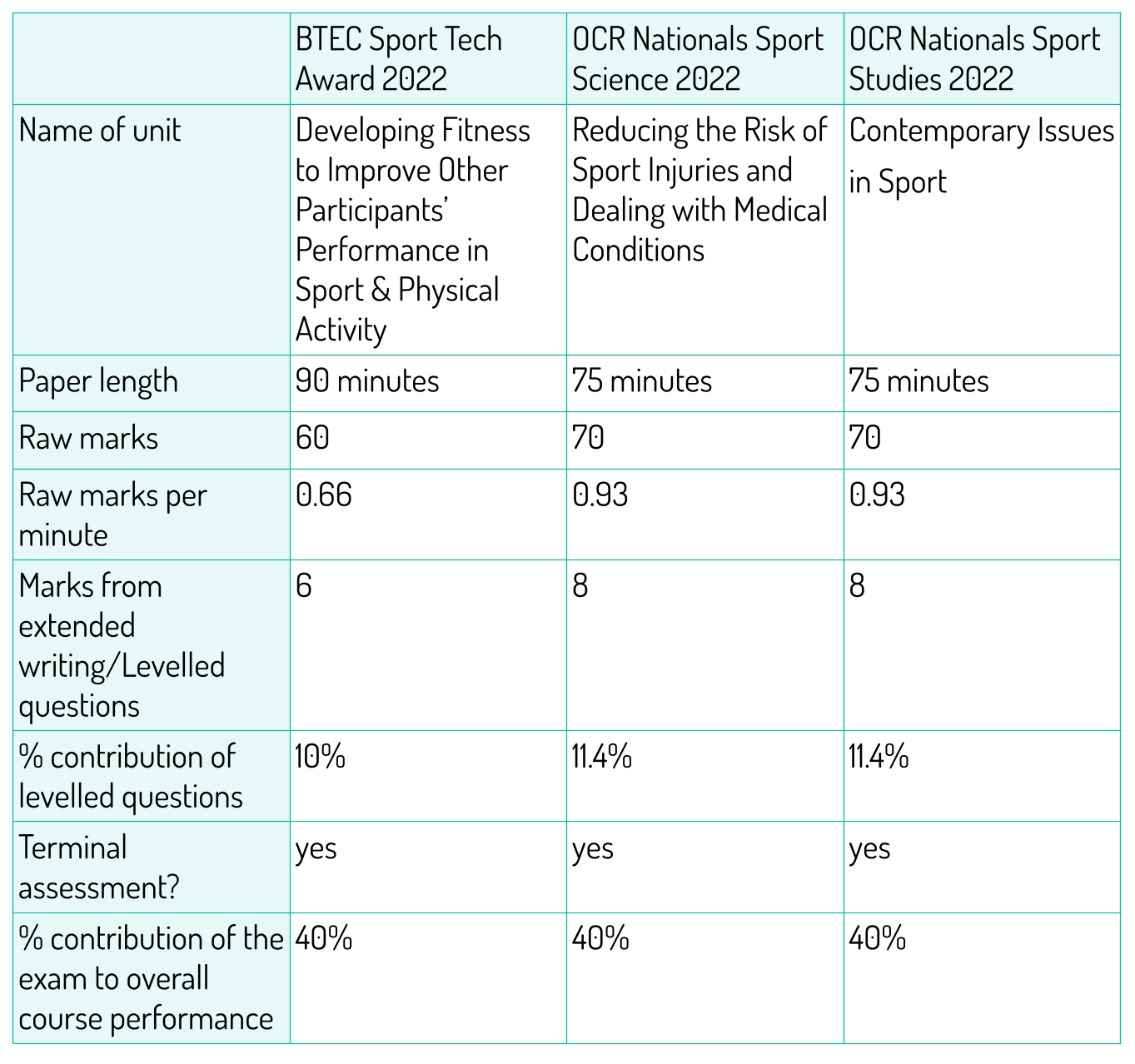 Colleagues will interpret the information in the table above differently, but here are my five key takeaways:
Colleagues will interpret the information in the table above differently, but here are my five key takeaways:
- With all courses being structured with 40% of marks coming from an examination, centres need to refocus their course deliveries with knowledge retention as a more central theme.
- The OCR National qualifications hit the “golden ratio” of between 0.9 and 1.0 raw marks per minute. Disappointingly, the BTEC Tech Award requires only 0.66 marks per minute. Whilst this may attract some centres based on “accessibility”, it should be judged for being not rigorous enough and certainly not comparable to other respected KS4 PE qualifications.
- Across all of these qualifications, centres need to prepare their students for “terminal assessments”. This means that exams can only be taken in year 11 and that the final exam score will be carried forward regardless of whether it is an improvement on the previous (January) attempt.
- All three exams have a modest contribution from levelled questions with roughly 1 in 10 marks coming from extended writing. This will limit the opportunity for higher-performing students to differentiate themselves and, more importantly, to be credited for higher level knowledge, application, evaluation or analysis.
- Finally, and perhaps not the most obvious point to make, all three of these exam experiences could be easily realised online. Given that the new technical qualifications must have written papers, this is quite ironic. For example, the OCR National papers have 25/70 marks coming from MCQ-style questions as well as many other shorter mark question iterations. I wonder why we are taking this backward step.
So, what should you do in your centre?
The reality is that neither I nor anyone else can answer this for you. You work in your specific context with your specific students with the history of teaching courses in your department that is specific to you. However, I would like to share some guiding principles and a few opinions.
- All centres must prepare themselves for terminal assessments. In the context of the BTEC Tech Award 2022, this is going to mean that learners will sit all three assessments in the final few months of their year 11 experience. With this in mind, centres absolutely must position knowledge retention at the centre of the learning experience.
- It is essential that centres do offer a qualification from September 2022. The young people we are currently teaching on our legacy BTEC and OCR Nationals courses benefit from those experiences and their successors need the equivalent offer. Centres who opt out of offering a technical award by offering no KS4 qualification are failing to provide a worthy offer to their learners.
- Marking experiences are going to change. OCR are robust in their stance that coursework resubmission should be minimal. Pearson/Edexcel have structured their qualification so that marking of the NEA units will be terminal. Whilst this will cause an explosion of marking time in May and June, teachers can be reassured that this will be the exception in the teaching year, not the norm.
- Optionality matters. Pearson/Edexcel have removed all optional units and replaced them with three compulsory units. Whilst this is common in PE and Sport qualifications such as GCSE PE, this is uncommon in vocational and technical qualifications and some centres will switch to OCR for this reason. Furthermore, the OCR National Sport Studies course includes a unit dedicated to outdoor activities. I strongly support this position and OCR should be congratulated for this stance. I do acknowledge that relatively few centres will choose this option but OCR need to be congratulated for providing it. When all is said and done, in the UK we live on a small island of beautiful hills, coastline, rivers etc… not just in urban environments where only football and netball get played.
- Exam performance is increasingly important to success in these courses. 40% of all marks are going to come from exams. Therefore, centres need to focus on this specific practice within classrooms. I recommend that, at the very minimum, ⅓ of the GLHs for the examined units are spent in an exam practice environment. This environment can be formative in nature and need not be stale nor stuffy but anything short of this is allocation of time and experience will cause students to fall well short of the skills needed to succeed in KS4 exams. This is even more the case for the BTEC Tech Award 2022 exam, which relies on knowledge built from components 1 and 2, as well as content unique to component 3. Exam practice needs to be a central theme running through the course.
…and the verdict?
Time will tell but, as things stand, I believe these outcomes will occur:
- Approximately 25% reduction in BTEC Tech Award 2022 numbers compared to BTEC Sport First Award 2018.
- OCR Nationals will approximately double their current scale. Across both legacy OCR Nationals, there are 10k students. The new OCR Nationals 2022 combined will enrol in the region of 20k. The main drivers for this, apart from the opportunity to switch that new courses provide, is the optionality built into the courses by OCR as well as the lack of Pearson Set Assignments (PSAs), which will threaten the current practices of centres on the BTEC Sport First Award 2018.
- A loss of up to 5k PE and sport qualifications overall with some centres choosing to no longer offer a certificated qualification at KS4. Whilst this will not be the norm, the perceived increase in rigour will “spook” some centres.
- Centres with success in delivering GCSE courses will place higher value on the new technical qualifications compared to the legacy courses. This will mean that dual offers or offering the OCR National/BTEC Technical 2022 instead of GCSE will be considered by some.
- For the OCR Nationals, the vast majority of centres will offer the Sport and the Media option on the Sport Studies course and the Body’s Response to Physical Activity & Technology on the Sport Science course. The PE sector is not currently confident in the delivery of outdoor adventure nor the area of digestion and nutrition and this will play out in most centres.
Conclusion
I hope that what is detailed above is helpful to you. Please, remember that I work for neither of the exam boards nor am I directly affiliated to them. I hope that my independence is a useful contribution to this area.
The OCR Nationals will be the main winner in this conversation. We anticipate that their numbers will approximately double and, given the structure they have presented, this seems fair and reasonable. If this is accurate, this will make OCR Nationals the fifth biggest PE course in England and Wales with almost the same number of students as Edexcel and OCR GCSE PE 9-1. In other words, OCR Nationals, your time has come.
%20Text%20(Violet).png)
